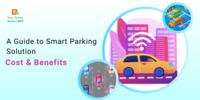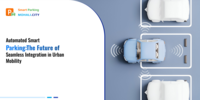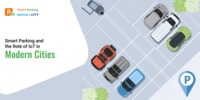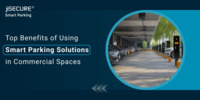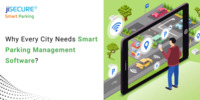- Jun 20, 2025
Share this post on:
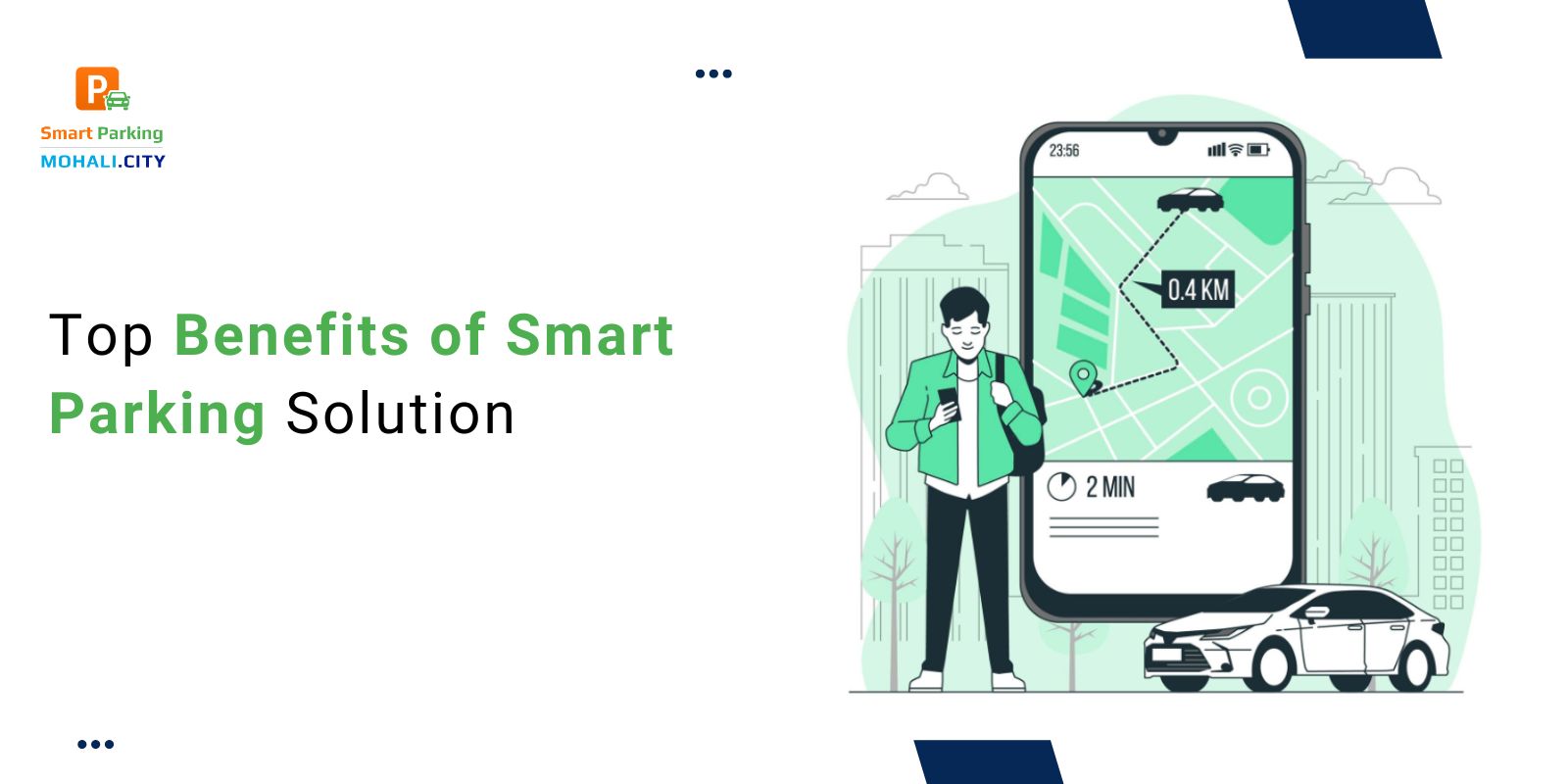
Smart parking solutions are revolutionizing the way urban areas, businesses, and property managers handle parking challenges. As cities grow and vehicle numbers increase, the traditional methods of finding and managing parking spaces have become inefficient, frustrating, and environmentally harmful. Smart parking technology leverages sensors, cameras, cloud computing, and mobile apps to transform parking into a seamless, efficient, and user-friendly experience. This blog explores the top benefits of smart parking solutions, illustrating how they improve driver convenience, reduce environmental impact, enhance safety, and optimize parking management.
1. Reduces Stress and Saves Time for Drivers
One of the most immediate and tangible benefits of smart parking systems is the significant reduction in stress and time spent searching for parking. Traditionally, drivers often circle blocks or parking lots for extended periods trying to find an available spot, leading to frustration and wasted time. Smart parking solutions use sensors and cameras to detect available spaces in real-time and communicate this information to drivers via mobile apps or digital signage. This allows drivers to locate and reserve parking spots before arriving, eliminating the guesswork and endless searching.
Research shows that using smart parking systems can reduce the time spent searching for a parking spot by up to 80%, dramatically improving the convenience of parking. This time savings means drivers can focus on more important activities, whether it’s getting to work on time, attending appointments, or enjoying leisure activities without the parking hassle.
2. Reduces Traffic Congestion and Carbon Emissions
An often overlooked but critical benefit of smart parking is its positive environmental impact. When drivers spend less time driving around looking for parking, there is a direct reduction in traffic congestion. This leads to smoother traffic flow in busy urban areas and less idling, which significantly cuts down on fuel consumption and harmful emissions.
Studies have quantified these benefits, showing that smart parking users consume far less fuel and emit considerably fewer greenhouse gases compared to traditional parking searches. For example, one study highlighted an 80% reduction in search time, fuel consumption, and CO2 emissions when drivers used smart parking systems. This reduction not only improves air quality but also contributes to broader efforts to combat climate change and create sustainable cities.
3. Enhances Parking Space Utilization and Maximizes Revenue
Smart parking systems enable parking operators and city authorities to optimize the use of available parking spaces. By providing real-time data on occupancy and usage patterns, these systems help identify underutilized areas and peak demand times. This insight allows for dynamic pricing strategies, where parking fees can be adjusted based on demand, encouraging turnover and maximizing revenue.
Additionally, automated allocation of parking spaces through intelligent algorithms ensures that every spot is used efficiently, reducing wasted space and increasing the total number of vehicles accommodated. This optimization is particularly valuable in dense urban environments where parking is limited and expensive.
4. Simplifies Payment Processes and Improves User Experience
Smart parking solutions often integrate seamless payment options through mobile apps or contactless methods, eliminating the need for cash or physical tickets. Drivers can pay for parking remotely, extend their parking time without returning to their vehicle, and receive notifications when their time is about to expire.
This ease of payment enhances the overall user experience, making parking less of a chore and more convenient. It also reduces queues and bottlenecks at payment kiosks, further speeding up the parking process. For property managers, automated payment tracking reduces administrative burdens and improves revenue collection accuracy.
5. Increases Safety and Security
Safety is a paramount concern in parking facilities, and smart parking systems contribute significantly to enhancing security. Equipped with cameras and license plate recognition technology, these systems monitor who enters and exits the parking area, helping to deter unauthorized access, theft, vandalism, and other criminal activities.
Real-time surveillance and data analytics allow operators to respond quickly to incidents and maintain a secure environment for both drivers and their vehicles. This increased security provides peace of mind to users and can reduce insurance costs for property owners.
6. Provides Valuable Data and Insights for Better Management
Smart parking technologies generate rich datasets that can be analyzed to understand parking trends, peak usage times, and user behavior. For city planners, local councils, and parking operators, this data is invaluable for making informed decisions about infrastructure investments, policy adjustments, and operational improvements.
By integrating smart parking data with broader city management systems, authorities can better coordinate traffic management, public transport, and urban development initiatives. This data-driven approach leads to smarter, more sustainable urban environments.
7. Supports New Business Models and Smart City Integration
The flexibility of smart parking technology opens the door to innovative business models. For example, dynamic pricing, reward programs, and app-based payments create new revenue streams and improve customer loyalty. Smart parking also facilitates targeted enforcement, where staff can focus on vehicles that have overstayed, improving compliance and operational efficiency.
Moreover, smart parking is a critical component of the broader smart city ecosystem. It aligns with standards such as ISO 37122 for sustainable cities and integrates with other smart infrastructure like environmental sensors and traffic management systems. This synergy enhances the overall quality of urban life and supports future-ready city planning.
8. Reduces Operational Costs and Improves Enforcement
Traditional parking management often involves significant manual labor, including permit issuance, payment collection, and enforcement patrols. Smart parking automates many of these tasks, reducing the need for physical infrastructure like parking meters and the manpower required for enforcement.
Automated permit management, real-time monitoring, and targeted enforcement reduce overhead costs and improve operational efficiency. This automation allows property managers and city authorities to allocate resources more effectively and focus on strategic priorities.
9. Improves Accessibility and Convenience for Special Needs
Smart parking systems can prioritize and manage spaces reserved for disabled drivers, public service vehicles, or emergency responders. By providing real-time availability and easy reservation options, these systems ensure that those with special parking needs have reliable access.
This focus on accessibility enhances inclusivity and complies with regulatory requirements, improving the overall fairness and usability of parking facilities.
10. Enhances Overall Urban Mobility and Quality of Life
By reducing the time and frustration associated with parking, smart parking solutions contribute to smoother urban mobility. Less congestion and pollution, combined with better-managed parking resources, improve the livability of cities.
Drivers experience less stress, businesses benefit from increased customer satisfaction, and communities enjoy cleaner, safer streets. Smart parking is thus a key enabler of sustainable urban development and a higher quality of life for residents and visitors alike.
Conclusion
Smart parking solutions offer a comprehensive range of benefits that address the challenges of modern urban mobility and parking management. From reducing driver stress and environmental impact to enhancing security and operational efficiency, these technologies are transforming parking from a daily headache into a streamlined, data-driven service.
As cities continue to grow and embrace smart technologies, the adoption of smart parking systems will become increasingly essential. Their ability to save time, reduce emissions, maximize revenue, and improve safety makes them a valuable investment for municipalities, businesses, and property managers aiming to create smarter, more sustainable urban environments.
By harnessing the power of real-time data, automation, and mobile connectivity, smart parking solutions are not just improving parking—they are reshaping the future of urban mobility.
